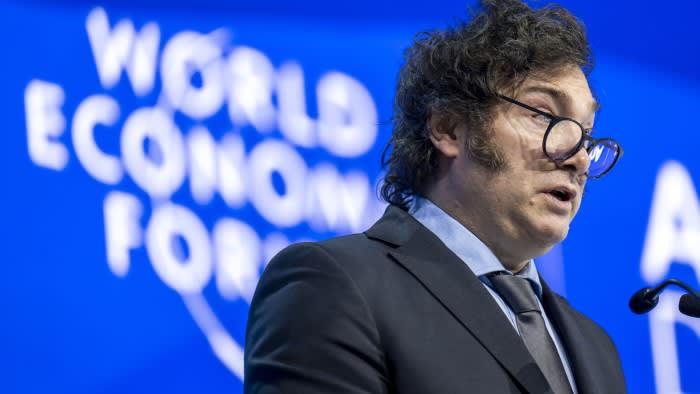Unlock the Editor’s Digest for free
Roula Khalaf, Editor of the FT, selects her favourite stories in this weekly newsletter.
Argentina’s new libertarian president Javier Milei has accused western leaders of abandoning “the values of the west” in a high-profile address to the World Economic Forum, marking a dramatic debut on the world stage.
“I am here to tell you that the western world is in danger . . . because those who are supposed to defend the values of the west have been co-opted by a vision of the world that inexorably leads to socialism, and therefore to poverty,” Milei told an audience in Davos on Wednesday.
He said “international organisations” had been influenced by “collectivism”, “radical feminism” and a “cruel . . . environmental agenda”.
Milei, a self-described anarcho-capitalist and former television pundit, was elected on an anti-establishment platform in November amid the troubled South American economy’s worst crisis in two decades.
His economic policies have won initial support from the IMF, whose technical staff approved a disbursement of funds to Argentina last week and whose deputy managing director Gita Gopinath told the Financial Times the new administration had “moved boldly to correct several of the misalignments that are there in the economy”.
Milei’s Davos appearance, his first overseas trip as president, was his first chance to pitch his ultraliberal vision to the global elite following his shock election victory.
Milei said on Wednesday: “The case of Argentina is an empirical demonstration that no matter how rich you may be, or how much you may have in terms of natural resource . . . if measures are adopted that hinder the free function of markets . . . the only possible fate is poverty.”
Since taking office in December, the libertarian economist has moved rapidly to slash Argentina’s fiscal deficit and deregulate the economy.
The IMF delivered a vote of confidence in Milei’s plans last week as its technical staff approved a $4.7bn disbursement of the country’s $43bn loan programme, enabling it to pay the fund back for earlier lending. Argentina is its largest debtor.
The decision is pending approval by the IMF’s board. Milei is due to meet IMF managing director Kristalina Georgieva on Wednesday.
Gopinath cited Milei’s 54 per cent devaluation of the official exchange rate in December as one of his administration’s “bold” moves.
She said a “strong fiscal anchor” was an “important” condition for an improvement. “And that was what this administration did, which previous administrations were not able to do.”
The IMF held tense, drawn-out talks last year with Argentina’s previous left-leaning Peronist government, which printed billions of pesos to fund pre-election cash handouts and publicly blamed the IMF for an unpopular currency devaluation in August.
Argentina and the fund last week unveiled a target for the country to reach a fiscal surplus of 2 per cent of gross domestic product in 2024, revised upwards from a 0.9 per cent deficit target. The new goal would imply spending cuts and tax increases worth about 5 per cent of GDP.
Markets have so far responded positively to Milei’s plans. Argentina’s deeply distressed 2030 dollar bonds, some of the most liquid, have risen 22 per cent since November’s election to 37 cents.
However, there are concerns about the president’s ability to implement reforms. Milei’s party lacks a majority in both houses of congress, which could block some of his fiscal measures, and powerful labour unions oppose his plans.
Analysts have said the fund will probably hold back from committing significant new financing to Argentina until Milei can show his reforms are sustainable.
Gopinath said the “large scale” of the planned adjustment has “big implications for the economy” in a country where more than 40 per cent of people already live in poverty.
“This is something we have to be very careful about,” she said, noting that authorities had announced targeted support measures, including an increase to child benefit and food aid, for the “transition period”.
“As of now, there seems to be quite a bit of ground support for the administration and what they are trying to do. I think there’s a recognition that . . . this is a tough period, but it is important to go down a path so you can . . . actually get to a point where inflation is lower, incomes start growing, [and you] are able to raise more people out of poverty.”

Emily Foster is a globe-trotting journalist based in the UK. Her articles offer readers a global perspective on international events, exploring complex geopolitical issues and providing a nuanced view of the world’s most pressing challenges.








